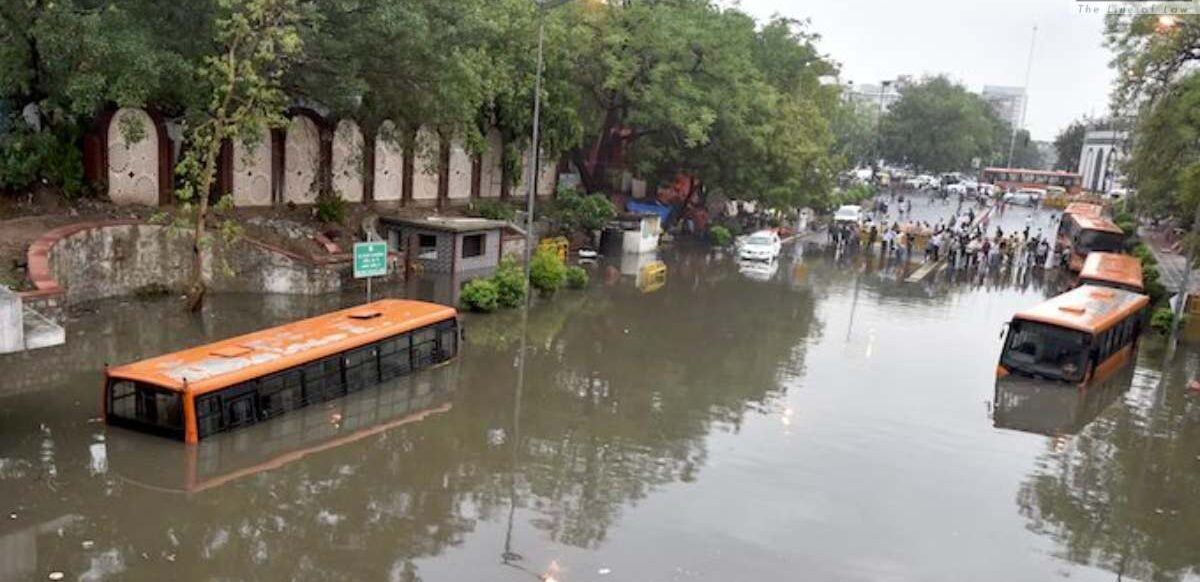NEW DELHI: Persistent water logging has worsened because of urbanisation.
Waterlogging during the monsoon has become routine for Delhi residents, with flooding occurring in most areas within 20-30 minutes of heavy rain. The city’s outdated and deteriorating drainage system significantly exacerbates these issues. Recently, heavy rains led to widespread waterlogging across Delhi and the NCR. Although the rain has ceased, the waterlogged streets continue to cause problems, highlighting the Delhi government’s failure to address and mitigate waterlogging in the capital.
The primary issue behind Delhi’s frequent deluges is its ageing drainage system, which dates back to 1976, just before the last major flood in the city. According to the Public Works Department (PWD), which has considered transferring drainage responsibilities to the Irrigation and Flood Control Department, the 1976 master plan was designed for a population of about 6 million and rainfall of up to 50 mm. Today, with a population exceeding 25 million and recent rainfall exceeding 150 mm, the outdated system is overwhelmed. Despite claims from the Delhi government about their readiness to tackle waterlogging, significant upgrades to the drainage system have not been made in the past 12 years.
In 2011, the Delhi government requested a new drainage master plan from IIT Delhi, submitted in 2018. However, the plan was implemented only in 2021 before being shelved for being too “generic” and lacking actionable steps. Former Deputy Chief Minister Manish Sisodia then appointed the PWD as the nodal agency and decided to hire consultants to develop a comprehensive drainage master plan for each of Delhi’s three drainage basins: Najafgarh, Trans-Yamuna, and Barapullah. Consultants were expected by March 2022, but the tender for the Najafgarh basin in 2022 failed to attract many bidders.
In addition to the stalled master plan, a senior PWD official, speaking anonymously to The Sunday Guardian, noted that Delhi’s stormwater drains are outdated and inadequate for the 125 mm of rainfall received recently. “The pipelines are very old, leading to water overflow… Stormwater drains have also become clogged due to population growth and unauthorized construction,” the official said.
Environmentalist Jaidhar Gupta explained that Delhi’s recurrent waterlogging results from a combination of climate change and an outdated sewerage and stormwater system. Designed to handle only 50 mm of rainfall in 24 hours, the city’s drainage infrastructure is insufficient for recent downpours exceeding 200 mm. The problem is worsened by clogged combined sewerage and stormwater drains, blocked with plastic, silt, and debris. With no significant updates to drainage planning since the 1970s, Gupta warned that these issues will likely worsen, marking another governance failure in the capital.
Gupta also highlighted that persistent waterlogging disrupts daily life, causing traffic delays, property damage, and health risks from waterborne diseases. Rapid urbanisation has exacerbated the issue, as increased concrete structures have reduced open spaces that naturally absorb rainwater. Encroachment on natural water bodies and poor waste management further block drains with solid waste, particularly during heavy rains.
Politically, both ruling and opposition parties are engaged in a blame game rather than addressing the water logging issue. The Delhi BJP criticised Delhi PWD Minister Atishi Singh and the AAP government for the persistent problem, stating, “Atishi Ji, who tells a new lie every day, claimed the AAP government had cleaned all the drains—now, who will you hold responsible for this waterlogging?”
In response to sewer overflow complaints, Water Minister Atishi directed the Chief Secretary to mobilise resources to prevent a public health crisis

